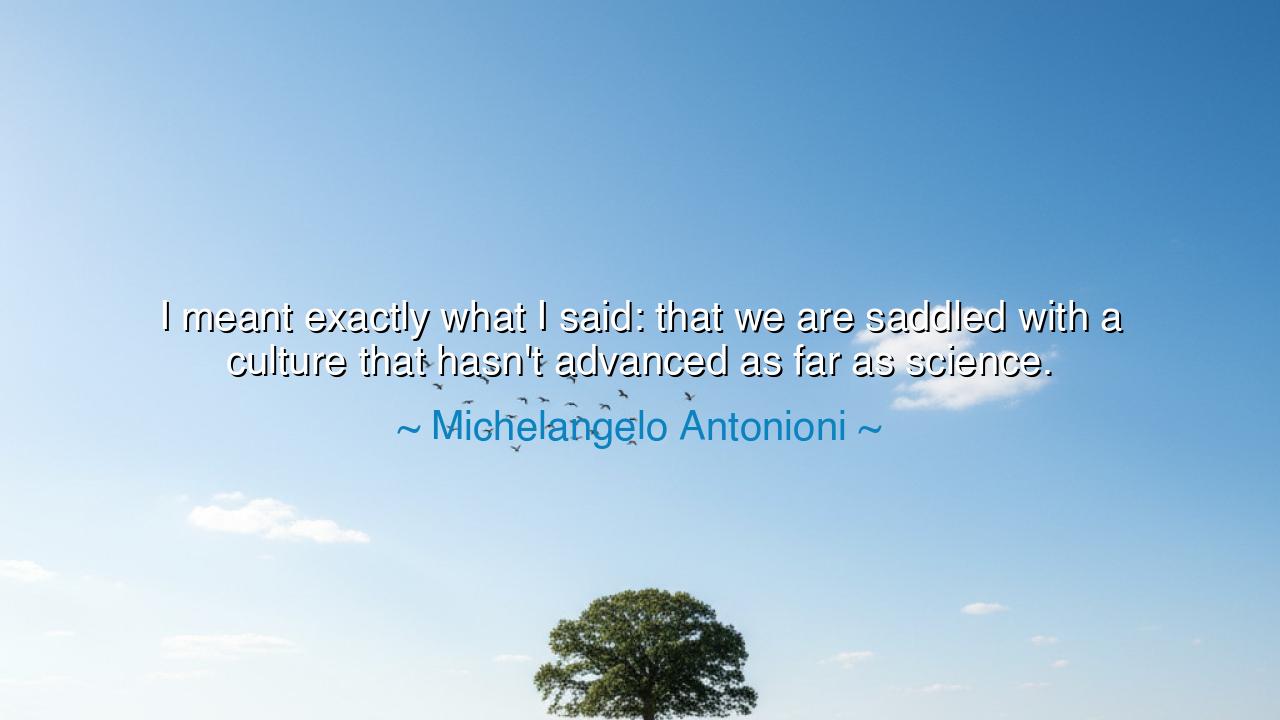
I meant exactly what I said: that we are saddled with a culture
I meant exactly what I said: that we are saddled with a culture that hasn't advanced as far as science.






Hear now, O children of the future, the words of Michelangelo Antonioni, a man who, with sharp clarity, spoke of the tension between science and culture. He said, "I meant exactly what I said: that we are saddled with a culture that hasn't advanced as far as science." These words strike at the heart of a timeless truth—a truth that has echoed through the ages, as civilizations have risen and fallen. Science has advanced, pulling humanity into realms once thought impossible, yet culture, in many ways, remains anchored to the past, bound by ancient traditions, unyielding beliefs, and practices that no longer serve the greater good. Antonioni calls us to reflect upon this gap between the progress of knowledge and the stagnation of societal growth.
In the ancient world, the philosophers were the ones who first grappled with the idea that human culture must evolve alongside the growing understanding of nature. Socrates, for example, challenged the Athenian culture by questioning its established norms, seeking to advance the intellect, to replace superstition with reason, and to encourage individuals to look beyond the shadows of their old beliefs. Yet, even in his time, there was a tension between the advancements in thought and the inertia of cultural practices. This clash, between the leap of science and the weight of tradition, is not new, but an age-old conflict that Antonioni so poignantly addresses.
Consider the example of Galileo Galilei, who, in his time, pushed the boundaries of knowledge in ways that were as profound as they were controversial. Galileo’s discoveries with the telescope challenged the very foundations of medieval culture, which held firmly to the belief that the Earth was the center of the universe. The church and much of society clung to a worldview rooted in tradition, while Galileo sought a deeper, more accurate understanding of the heavens. He understood that science was not meant to conform to cultural norms, but to push them forward, to break through the limitations of human ignorance. Yet, as Galileo's story demonstrates, even when science advances, culture often lags behind, hesitant to abandon its old certainties for the truth that science uncovers.
In our own time, Antonioni’s words still ring true. Consider the rapid advancements in technology, medicine, and engineering—fields that have reshaped our world and our daily lives in ways that were once unimaginable. Science has given us space travel, genetic engineering, and the power to cure diseases that once ravaged humanity. Yet, when we look at society, we see the same old divisions, conflicts, and prejudices that have plagued us for millennia. We live in an age where technology and knowledge have expanded far beyond the boundaries of our cultural evolution. Antonioni's lament is that science progresses at a pace that culture—with its entrenched values, traditions, and ways of thinking—cannot keep up with.
Think of the civil rights movement, a modern example of how culture must evolve to catch up with the advancements in science and human understanding. In the 1960s, the science of equality, through the works of thinkers, lawyers, and activists, made clear that there was no rational basis for racial inequality. Yet, despite this scientific understanding, cultural norms steeped in racism and prejudice remained strong, making it a struggle for society to align itself with the truths that science had so plainly revealed. It was a battle between progressive thought and deeply entrenched cultural practices. Antonioni’s words remind us that the power of science to reveal the truth does not automatically translate into cultural change; rather, it requires a revolution in the hearts and minds of people.
So, O children, let this be the lesson: science has the power to uncover the truth, to advance humanity beyond its current limitations. Yet, this power is meaningless if it is not accompanied by a shift in culture, in the values and beliefs that guide our lives. To advance in science is not enough; we must also evolve culturally, embracing new ways of thinking, shedding old prejudices, and living in a way that reflects the deeper truths science has revealed. As Antonioni reminds us, we must not remain shackled by the weight of outdated traditions but must strive to create a society that is not only scientifically advanced but also morally and ethically progressive.
Take this to heart, O future generations: Do not allow the advancements in knowledge and science to be held back by the chains of culture. Just as Galileo and countless other visionaries have shown, truth must be allowed to shape culture, and not the other way around. If we are to truly move forward, we must align the advances in science with the advancement of our human spirit, our compassion, and our understanding of justice and equality. Only then will we build a world that reflects the profound truth of our existence, one that is both scientifically and culturally enlightened.






AAdministratorAdministrator
Welcome, honored guests. Please leave a comment, we will respond soon